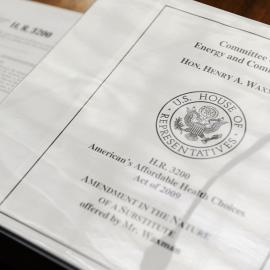To the Editor:
I enjoyed the exchange "Salute and Disobey?" opposing, among others, Michael Desch to Richard Meyers and Richard Kohn (September/October 2007). I find Desch's points more telling, but some important issues have been overlooked. Just as the president has his ultimate weapon (the codes for launching nuclear weapons) with him at all times, so does a military leader. He has a single-use trump card: resignation or request for relief from command. He can use it after all other means of persuasion have failed and the issue is really important.
The key elements in a decision to resign over a policy matter or a strategic concern are the importance of the matter and the clarity of the issue at stake. Once an officer has firmly established these essentials in his mind and laid them out clearly before his chief, he must in good conscience carry through. If he waffles, he changes the message. He misleads his political leader into thinking that the issue is not that important after all. How is the political leader likely to react to minor opposition? By ignoring it or blowing it off. The military leader who salutes and accepts orders for the execution of flawed policy should realize that by doing so he becomes a party to the policy.
But if he submits his resignation to emphasize the importance of the issue and the depth of his disagreement to his superior, he must be prepared to carry out his instructions until the resignation is accepted and he is relieved. The submission of a request for relief, in itself, is no excuse not to fulfill his responsibilities according to the law. It is, however, a clear indication to the superior of the subordinate's view of the magnitude of the issue in point. If the superior rejects the request but persists with his course, he assumes exclusive responsibility for his policy in the judgment of history.
Resignation should not be considered an act of disloyalty. In fact, it is one of the highest forms of loyalty. It is a demonstration that the officer is willing to stake his career on fulfilling his duty to convey his views to his superior. Military memoirs are full of recriminations over the failure of thickheaded superiors to listen to their subordinates. One seldom sees accounts of juniors who have put their careers on the line to underscore the importance of critical issues to reluctant or uncomprehending policymakers. If the military profession affords its members a deeper understanding of critical strategic or military matters than their civilian counterparts possess, it should also demand of them a readiness to fulfill this final duty.
